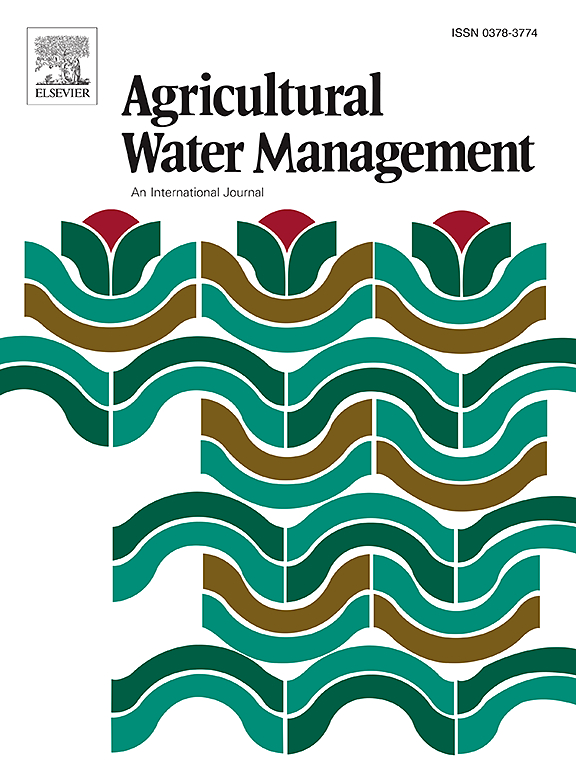Mild water deficit during maturity reduces cracking rate of greenhouse muskmelon while improving fruit quality
IF 5.9
1区 农林科学
Q1 AGRONOMY
引用次数: 0
Abstract
Fruit cracking is frequent in fleshy fruits and is closely related to unreasonable irrigation, affecting fruit yield and quality at harvest and therefore sales. However, it remains to be demonstrated whether there are reasonable deficit irrigation (DI) practices that could reduce fruit cracking while ensuring that yield is not reduced and fruit quality is improved. Three-season (spring 2021, spring 2022 and summer 2022) deficit irrigation experiments were conducted to investigated the responses of greenhouse muskmelons (Cucumis melo var. chinensis) in terms of plants water status, yield, irrigation water productivity (IWP), fruit cracking rate, output value and fruit quality. Results showed that cracked fruit rate was significantly positive with irrigation amount at fruit maturity stage (stage M). Furthermore, it was related with stem water potential at midday and transpiration just at stage M, not flowering-swelling stage (stage F). Although yield and IWP were not significantly affected under mild DI applied at stage M, cracked fruit rate was significantly decreased by 73 %, resulting in the highest output value. The application of DI during both stage F and M had a negative impact on fruit size, fresh weight and dry matter weight, but had a remarkable positive effect on the accumulation of soluble solids such as sugars. The comprehensive quality score based on principal component analysis and membership function method revealed that severe DI applied at entire reproductive period had optimal comprehensive quality score. Entropy-TOPSIS result indicated that mild deficit irrigation applied at stage M was a reasonable strategy for greenhouse substrate cultivation of muskmelon. This study provides a reasonable irrigation regime, which not only helps to improve fruit quality and ensure yield at harvest, but also reduces economic losses due to lower fruit cracking and opens up new prospects for horticultural production.
成熟期轻度水分亏缺可降低温室甜瓜的开裂率,提高果实品质
果裂在肉质水果中较为常见,与灌溉不合理密切相关,影响果实收获时的产量和品质,从而影响销售。然而,是否有合理的亏缺灌溉(DI)措施可以在保证不降低产量和提高果实品质的同时减少果实开裂,仍有待证明。采用三季(2021年春季、2022年春季和2022年夏季)亏缺灌溉试验,研究了温室甜瓜(Cucumis melo var. chinensis)植株水分状况、产量、灌溉水生产力(IWP)、果实开裂率、产值和果实品质对亏缺灌溉的响应。结果表明:果实成熟期(M期)裂果率与灌水量呈显著正相关,且只与M期正午茎秆水势和蒸腾有关,而与花胀期(F期)无关。M期施用轻度DI对产量和IWP影响不显著,但裂果率显著降低了73 %,产量最高。在F期和M期施用DI对果实大小、鲜重和干物质重均有负面影响,但对糖等可溶性固形物积累有显著的积极影响。基于主成分分析和隶属函数法的综合质量评分结果表明,全生育期重度DI的综合质量评分最优。熵熵topsis结果表明,M期轻度亏缺灌溉是甜瓜温室基质栽培的合理策略。该研究提供了一种合理的灌溉制度,不仅有助于提高果实品质,保证收获时的产量,而且可以减少果实开裂造成的经济损失,为园艺生产开辟了新的前景。
本文章由计算机程序翻译,如有差异,请以英文原文为准。
求助全文
约1分钟内获得全文
求助全文
来源期刊

Agricultural Water Management
农林科学-农艺学
CiteScore
12.10
自引率
14.90%
发文量
648
审稿时长
4.9 months
期刊介绍:
Agricultural Water Management publishes papers of international significance relating to the science, economics, and policy of agricultural water management. In all cases, manuscripts must address implications and provide insight regarding agricultural water management.
 求助内容:
求助内容: 应助结果提醒方式:
应助结果提醒方式:


